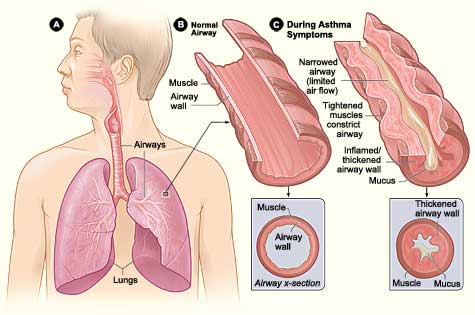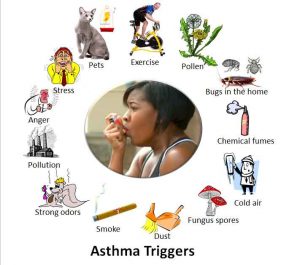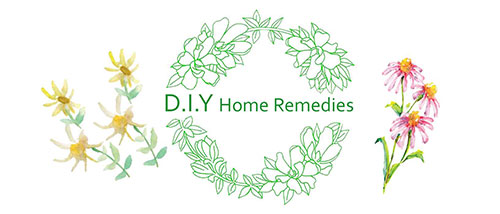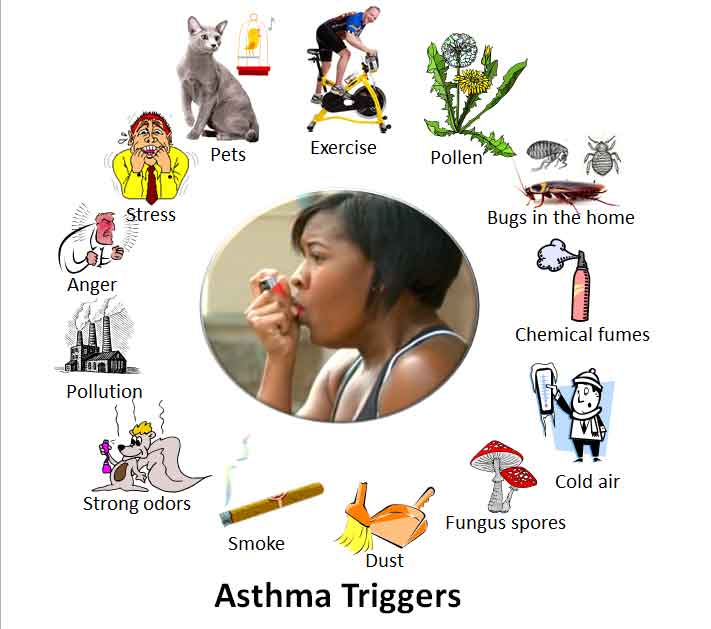If you’ve ever suffered from asthma, then you’ll recognise the symptoms of an asthma attack. That shortness of breath, wheezing, coughing and feelings of panic (from mild to severe). There are many home remedies for asthma, not curing, but relieving the symptoms of an asthma attack.
“These remedies are not to replace any medications prescribed by your health professional”.
Asthma is a disease of the lungs that causes difficulty breathing. These asthma attacks occur when there is an obstruction in the flow of air in the lungs.
Because the airways swell up during an asthma attack, the muscles around them become tight, causing the constriction of air around the lungs.

Triggers Of Asthma
- Outdoor allergens, such as pollens from grass,

Source: https://www.acrn.org/asthma-triggers trees and weeds
- Indoor allergens, such as pet hair, dust mites and mould
- Sulphites, an additive found in wine and some foods, check the labels
- Some drugs, common ones are:
- Aspirin
- Steroidal
- Anti-inflammatory
- Certain foods, the more common being:
-
- Eggs.
- Cow’s milk.
- Peanuts.
- Soy.
- Wheat.
- Fish.
- Shrimp and other shellfish.
- Tree nuts.
- Illnesses such as colds and flu
- Airborne irritants like smoke, chemical fumes and strong odors
- Exercise (although people with asthma can benefit from some exercise)
- Stress
- Weather, like wet and windy, cold air, very dry etc.
It’s important to get an allergy test so you can try and avoid common triggers. Everyone is different and the symptoms will vary from person to person.
Home Remedies For Asthma
Ginger
Ginger is a well-known natural treatment for various ailments including asthma. Some research suggests that ginger can help with airway smooth muscle relaxation1
There are a number of ways you can take ginger to relieve asthma symptoms:
- The easiest method is to buy some good quality ginger tea bags (most supermarkets sell them now).
- Mix 1tsp of ground ginger in 1 1/2 cups of water and take 1tbls at bedtime.
- Make an infusion by cutting 1inch of ginger into small pieces, add to a pot of boiling water and let steep for five minutes. let it cool before drinking.
- For lung detoxification, boil 1 tblsp of fenugreek seeds in a cup of water. Mix 1 tsp each of ginger juice and honey. Drink this solution every morning and evening.
- If you can, raw ginger mixed with salt, then chewed is good for helping to relieve that tightness.
Mustard Oil
This is a soothing oil mix to massage into your chest and upper back. Heat some mustard oil with a bit of camphor, both shown to be useful for respiratory problems2.
When comfortably warm, massage gently several times a day for instant relief .
Figs
There are a number of articles suggesting that constituents in figs dissolve mucus in the respiratory tract. I can’t find any recent studies but figs are mentioned in many herbal books for their usefulness in respiratory tract illnesses.3
- Soak 3, washed and dried figs overnight in a cup of water.
- Before breakfast, eat the soaked figs, then drink the fig water on an empty stomach.
Do this daily for as long as you need to.
Coffee
 My favorite! A cup of black coffee in the morning always helps to clear my lungs.
My favorite! A cup of black coffee in the morning always helps to clear my lungs.
The caffeine in coffee is very similar to the drug theophylline. Theophylline is a bronchodilator drug that is taken to open up the airways in the lungs and therefore relieves the symptoms of asthma, such as wheezing, coughing and breathlessness.4
As with all caffeine drinks, don’t drink too much, I find 2 cups in the morning is sufficient for me.
Don’t drink caffeine before going for a spirometer test it can affect the results.4
Garlic
To be used sparingly! For symptomatic relief in the early onset of an asthma attack
- Boil 2 to 3 cloves in 1/4 cup of milk (milk substitutes such as almond milk will work)
- Cool to room temperature and then drink.
Honey
That wonderful kitchen ingredient is back again, honey, so useful for many things!
Honey is particularly useful for infants when they start coughing and/or wheezing.5 Because of the sweetness, they find it more palatable than other home remedies for asthma such as garlic.
- For children, a teaspoon of honey before bed can help ease the symptoms, such as coughing and wheezing.
- Mix 1 tsp of honey into a glass of hot water and sip it about 3 times a day.
- Before bed, mix 1 tsp of honey with 1/2 tsp of cinnamon powder and take internally. This helps to remove phlegm allowing for a more restful sleep.
Onions
Onion may act as an anti-inflammatory in people with asthma. Human studies have shown onion can be a strong anti-inflammatory.6
Be careful though, some people with asthma may experience an exacerbation of symptoms if they are allergic to onions.
I’ve tried this and it really made my eyes water! I would suggest chewing on a mild onion if you want to try this home remedy or, cook the onions first.
Diet
 I’ve already listed some common food triggers of asthma but your daily diet can also have an effect.
I’ve already listed some common food triggers of asthma but your daily diet can also have an effect.
A healthy diet rich in fruits and vegetables can help with asthma symptoms.
Foods rich in magnesium, selenium beta-carotene, and vitamins C and E can help improve lung function.7
Fruits rich in Vit C include:
- oranges
- papayas
- blueberries
- strawberries
- lemons (add to the honey drink)
Avoid eating processed foods with artificial additives and preservatives. The chemicals (such as sulphites mentioned above) may trigger asthma attacks.
A healthy lifestyle which includes good food and exercise can go a long way to warding off asthma attacks. When you do need to try a home remedy for asthma, always consult your health professional first.
Resources
- https://www.ncbi.nlm.nih.gov/pmc/articles/PMC3604064/
- https://www.ncbi.nlm.nih.gov/pmc/articles/PMC3763377/
- Medicinal Trees and Shrubs by Paul PO Mathioli
- https://www.ncbi.nlm.nih.gov/pubmedhealth/PMHT0000290/
- https://www.ncbi.nlm.nih.gov/pmc/articles/PMC4264806/
- https://www.uofmhealth.org/health-library/hn-3657001
- https://respiratory-research.biomedcentral.com/articles/10.1186/rr65







